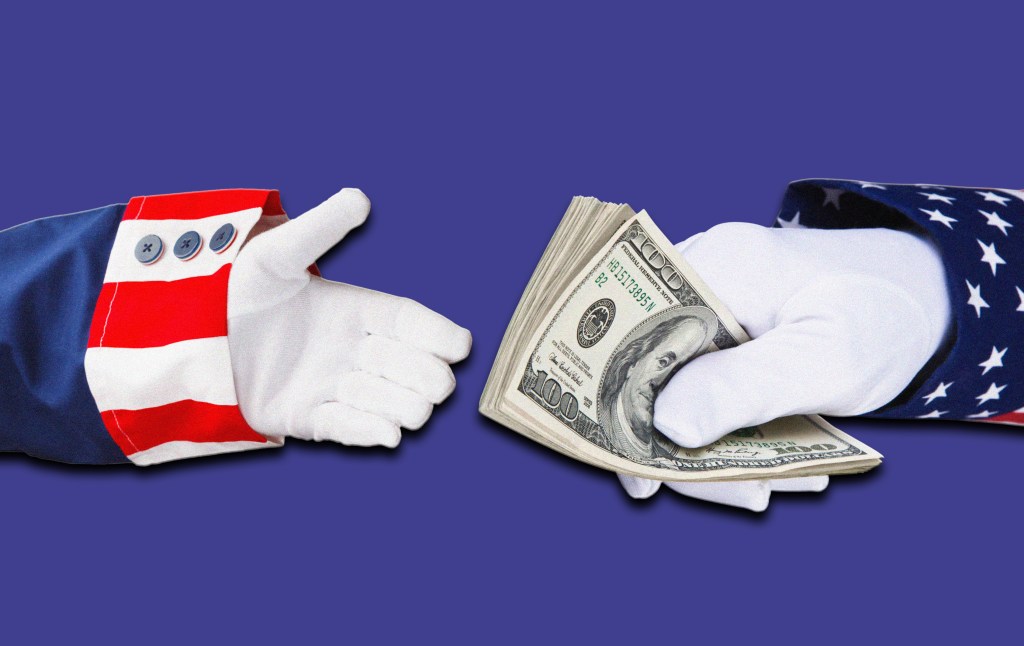On May 1, 2003, George W. Bush announced, “Major combat operations in Iraq have ended.” He was standing below a giant banner that read, “Mission Accomplished.” At the risk of inviting charges of understatement, subsequent events didn’t cooperate. But it took a while for that to be widely accepted.
We’re in a similar place when it comes to Donald Trump’s experiment with a new global trading order.
“Tariffs are making our country Strong and Rich!!!” proclaims Donald Trump, making him not only the first Republican president in living memory to brag about raising taxes on Americans, but also the first to insist that raising taxes on Americans makes us richer.
MAGA’s mission-accomplished groupthink relies primarily on three arguments.
The first is that Trump has successfully concluded a slew of beneficial trade deals. The truth is some of those deals are simply “frameworks” that will take a long time to be ironed out. But Trump got the headlines he wanted.
The second argument is a kind of populism-infused sleight-of-hand. The “experts” —their scare quotes, not mine—are wrong once again.
The White House social media account crows, “In April, ‘experts’ called tariffs ‘the biggest policy mistake in 95 years.’ By July, they generated OVER $100 BILLION in revenue. Facts expose the haters: tariffs WORK. Trust in Trump.”
But the high-fivers are leaving things out. The most dire predictions of economic catastrophe were based on the scheme Trump announced on April 2, aka “Liberation Day.” Trump quickly backed off (“chickened out” in Wall Street parlance) that plan in response to a bond and stock market implosion.
Saying the experts were wrong under those circumstances is like saying experts opposed to defenestration were wrong when they successfully persuaded a man not to jump out a window.
As for the argument—made by the White House and many others—that tariffs are working because they’re raising money is a response to a claim no one made. To my knowledge, no expert claimed tariffs wouldn’t raise money. The estimates of these revenues from Trump World are stratospheric. Commerce Secretary Howard Lutnick expects somewhere between $700 billion to $1 trillion per year. Last month, the government collected $29 billion. But it’s likely this number will significantly increase as more tariffs come online and businesses run down the inventory they stockpiled earlier this year in anticipation of more tariffs to come.
Normally, Republicans don’t exult over massive revenues from tax hikes. But Trump’s defenders get around this problem by insisting that money is “pouring” and “flowing” into America from someplace else.
It’s true that tariff revenue is pouring into the Treasury, but that money is coming out of American bank accounts, because American importers pay the tariff. Even Treasury Secretary Scott Bessent cannot deny this when pressed.
So yes, tariffs are “working” the way they’re supposed to; the problem is Trump thinks tariffs work differently than they do.
It’s possible some foreign exporters might lower prices to maintain market share and some American businesses might absorb the costs—for now—to avoid sticker shock for inflation-beleaguered consumers, but what revenue is generated still comes from Americans. Ultimately it means higher prices paid here, reduced profits for businesses here or reduced U.S. trade overall.
Sometimes, when pressed, defenders of the administration will concede the true source of the revenues, but then they say the pain is necessary to force manufacturers and other businesses to build and produce in the United States. It’s backdoor industrial policy masquerading as trade policy.
That, too, might “work.” But all of this will take time, no matter what. And, if it works, that will have costs, too. Manufacturing in America is more expensive—that’s why we manufacture so much stuff abroad in the first place. If this “reshoring” happens, our goods will be more expensive, and less money will “pour in” from tariffs.
It’s difficult to exaggerate how well-understood all of this was on the American right until very recently. But the need to grab any argument available to declare Trump’s experiment a success has a lot of people not only abandoning their previous dogma, but leaping to the conclusion that the dogma was wrong all along.
Maybe it was, though I don’t think so. The evidence so far suggests that problems are looming. The dollar is weakening. Prices continue to rise. The job market is reeling. The stock market (an unreliable metric, according to MAGA, when it plummeted after Liberation Day) is holding on, thanks to tech stocks. The truth is we won’t have real evidence for a while.
It’s worth remembering that Americans don’t live by headlines and press releases, and they don’t live in the macro economy either. Declaring “Mission Accomplished” for the macroeconomy won’t convince people they’re better off in their own microeconomies when they’re not.










Please note that we at The Dispatch hold ourselves, our work, and our commenters to a higher standard than other places on the internet. We welcome comments that foster genuine debate or discussion—including comments critical of us or our work—but responses that include ad hominem attacks on fellow Dispatch members or are intended to stoke fear and anger may be moderated.
With your membership, you only have the ability to comment on The Morning Dispatch articles. Consider upgrading to join the conversation everywhere.